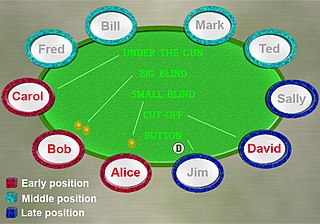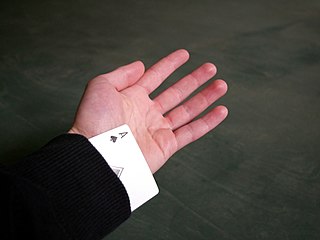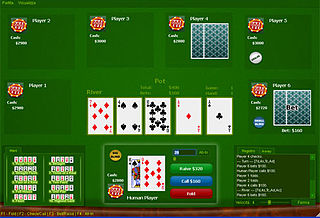
Poker is a family of comparing card games in which players wager over which hand is best according to that specific game's rules. It is played worldwide, but in some places the rules may vary. While the earliest known form of the game was played with just 20 cards, today it is usually played with a standard deck, although in countries where short packs are common, it may be played with 32, 40 or 48 cards. Thus poker games vary in deck configuration, the number of cards in play, the number dealt face up or face down, and the number shared by all players, but all have rules that involve one or more rounds of betting.
Blinds are forced bets posted by players to the left of the dealer button in flop-style poker games. The number of blinds is usually two, but it can range from none to three. When there are two blinds they are called the small blind and the big blind.
In poker, a freeroll tournament is a tournament with no entry fee, and a freeroll hand is where a player is guaranteed to at least split the pot with their opponent, with a chance they can win the whole pot if certain final cards are dealt.

In the game of poker, the play largely centers on the act of betting, and as such, a protocol has been developed to speed up play, lessen confusion, and increase security while playing. Different games are played using different types of bets, and small variations in etiquette exist between cardrooms, but for the most part the following rules and protocol are observed by the majority of poker players.
Five-card stud is the earliest form of the card game stud poker, originating during the American Civil War, but is less commonly played today than many other more popular poker games. It is still a popular game in parts of the world, especially in Finland where a specific variant of five-card stud called Sökö is played. The word sökö is also used for checking in Finland.

Texas hold 'em is one of the most popular variants of the card game of poker. Two cards, known as hole cards, are dealt face down to each player, and then five community cards are dealt face up in three stages. The stages consist of a series of three cards, later an additional single card, and a final card. Each player seeks the best five-card poker hand from any combination of the seven cards: the five community cards and their two hole cards. Players have betting options to check, call, raise, or fold. Rounds of betting take place before the flop is dealt and after each subsequent deal. The player who has the best hand and has not folded by the end of all betting rounds wins all of the money bet for the hand, known as the pot. In certain situations, a "split pot" or "tie" can occur when two players have hands of equivalent value. This is also called "chop the pot". Texas hold 'em is also the H game featured in HORSE and HOSE.

Cheating in poker is any behavior outside the rules of poker that is intended to give an unfair advantage to one or more players.

A poker tournament is a tournament where players compete by playing poker. It can feature as few as two players playing on a single table, and as many as tens of thousands of players playing on thousands of tables. The winner of the tournament is usually the person who wins every poker chip in the game and the others are awarded places based on the time of their elimination. To facilitate this, in most tournaments, blinds rise over the duration of the tournament. Unlike in a ring game, a player's chips in a tournament cannot be cashed out for money and serve only to determine the player's placing.

Online poker is the game of poker played over the Internet. It has been partly responsible for a huge increase in the number of poker players worldwide. Christiansen Capital Advisors stated online poker revenues grew from $82.7 million in 2001 to $2.4 billion in 2005, while a survey carried out by DrKW and Global Betting and Gaming Consultants asserted online poker revenues in 2004 were at $1.4 billion. In a testimony before the United States Senate regarding Internet Gaming, Grant Eve, a Certified Public Accountant representing the US Accounting Firm Joseph Eve, Certified Public Accountants, estimated that one in every four dollars gambled is gambled online.
Vigorish is the fee charged by a bookmaker for accepting a gambler's wager. In American English, it can also refer to the interest owed a loanshark in consideration for credit. The term came to English usage via Yiddish slang which was itself a loanword from Russian.

In poker, the buck or dealer button is a marker used to indicate the player who is dealing or, in casino games with a house dealer, the player who acts last on that deal. The term button is also used for a variety of plastic discs, or lammers, used by casinos to mark the status of players.
In poker, bad beat is a subjective term for a hand in which a player with what appear to be strong cards nevertheless loses. It most often occurs where one player bets the clearly stronger hand and their opponent makes a mathematically poor call that wins with any subsequent dealing to complete the hand.

Commerce Casino is a cardroom located in the Los Angeles suburb of Commerce. With over 240 tables on site, Commerce Casino is the largest cardroom in the world. Established in 1983, the casino accounted for 38% of Commerce's tax revenues for the 2006-2007 fiscal year. As of 2016, the casino was providing $22 million a year in licensing fees to the city.

A poker dealer distributes cards to players and manages the action at a poker table.

A cardroom or card room is a gaming establishment that exclusively offers card games for play by the public. The term poker room is used to describe a room in casinos that is dedicated to playing poker and in function is similar to a card room.

Cash games, also sometimes referred to as ring games or live action games, are poker games played with "real" chips and money at stake, often with no predetermined end time, with players able to enter and leave as they see fit. In contrast, a poker tournament is played with tournament chips worth nothing outside the tournament, with a definite end condition, and a specific roster of competitors.
Poker tools are a variety of software or web-based applications that allow the statistical analysis of poker players, games or tournaments.
The following is a glossary of poker terms used in the card game of poker. It supplements the glossary of card game terms. Besides the terms listed here, there are thousands of common and uncommon poker slang terms. This is not intended to be a formal dictionary; precise usage details and multiple closely related senses are omitted here in favor of concise treatment of the basics.
Draw poker is any poker variant in which each player is dealt a complete hand before the first betting round, and then develops the hand for later rounds by replacing, or "drawing", cards.

Casino Helsinki is a casino located in Helsinki, Finland, located less than a ten minute walk from Central Railway Station. It's owned by government-owned Veikkaus and is one of the few casinos in the world, and the second in Finland, to donate all of its profits to charity. The other non-profit casino in Finland is Paf which donates all of its profits from the autonomous Åland islands. Casino Helsinki employs around 200 people, and it had around 305,000 visitors in 2009 with around 30 million euros of revenue.